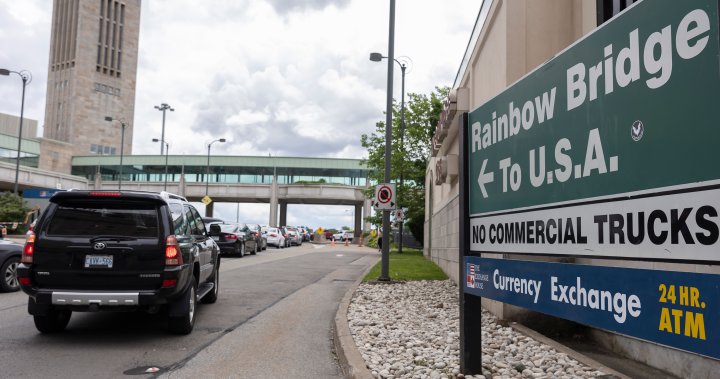Jobs
Changes to temporary foreign worker program raise concerns for Sask. residents, employers | CBC News

A woman living in Regina says she’s worried changes the federal government announced Monday to the temporary foreign worker program may affect her ability to stay here.
“I was 18 when I came here, and now I’m 23,” said Gurnoor Kaur, who moved to Canada from India in 2019 as an international student.
“Spending five years in a country and moving back is really difficult because you’ve already learned a lot of things about the new country.”
Kaur said she was first counting on being able to stay through a Saskatchewan pilot program that aimed to match skilled international workers with vacancies in high-demand occupations.
But when that immigration pathway was abruptly ended in March, she had hoped the temporary foreign worker program would give her a way to stay in Canada.
On Monday, however, the federal government announced it will reduce the number of temporary foreign workers in Canada — a move Kaur, and others in Saskatchewan, say could affect them.
Kaur said the announcement has her scrambling as she’s working to repay her student debt, while also sending part of her income back home to her family.
Kaur studied to be an early childhood educator in Canada.
“For five years, whatever my personality has developed, it’s according to Canada. If I go back to India now, it’s going to be difficult to settle down,” she said.
The temporary foreign worker program is intended to help employers fill short-term staffing shortages with foreign workers when no Canadians or permanent residents are available for that position, according to the federal government.
In announcing the changes to the temporary foreign worker program Monday, Prime Minister Justin Trudeau said Canadian businesses need to “invest in training and technology, not increasing their reliance on low-cost foreign labour.”
Saskatchewan Immigration Minister Jeremy Harrison said the province supports the use of temporary workers as a last resort for employers.
“Any measures that are going to strengthen that program integrity framework are positive and we will continue to encourage the federal government to take that very seriously,” Harrison said.

Saskatchewan accepts roughly 2,000 temporary foreign workers every year, including both high-wage and low-wage workers, he said.
According to federal government data, Regina companies employed 347 temporary foreign workers in the first quarter of 2024.
Trudeau said Monday that under the changes, employers in high unemployment areas — where the unemployment rate is six per cent or higher — will not be able to hire low-wage temporary foreign workers.
Statistics Canada divvies Saskatchewan’s employment numbers by northern Saskatchewan, southern Saskatchewan, Regina, and Saskatoon. All of those areas, except Saskatoon, had an unemployment rate of more than six per cent in July.
Ottawa loosened TFW restrictions during a severe post-COVID labour shortage — a decision that led, in particular, to a spike in the number of low-wage workers.
The federal government also said Monday employers will no longer be allowed to hire more than 10 per cent of their total workforce through the TFW program.
There will be exemptions, though, for “food security sectors” like agriculture, as well as sectors like construction and health care where there are acute staffing shortages, Trudeau said Monday.

Evan LeBras, who owns LeBras Farms in Arborfield, about 220 kilometres northeast of Saskatoon, said he’s relied on foreign workers every year for more than six years — and will continue to do so because of the agriculture exemption.
“The local job market, the people aren’t wanting these jobs. It’s hard to find 90 per cent of nothing. Some people just don’t want to do some not-so-nice jobs” that involve “some heavy, heavy work,” LeBras said.
According to a recent Bank of Canada report, the unemployment rate for immigrants stands at 11.6 per cent — well above the overall unemployment rate of 6.4 per cent recorded in June.
Ali Abukar, CEO of Saskatoon Open Door Society, said the decision to limit new foreign worker admissions could help drive unemployment down for Canadians, including newcomers like international students, refugees, or people coming through other immigration streams.
However, Abukar said there could be a better way of accommodating immigrants who are already in Canada.

“When they come here, they already get used to the Canadian culture, know about the community and environment. It’s easier for them to get a pathway and become a permanent resident,” he said.
Trudeau also said Monday the government is considering a reduction to the number of permanent residents Canada accepts each year.
The federal government has recently also moved to make several other immigration-related policy changes like capping international student visas or not renewing postgraduate work permits.
LISTEN | Sask. reaction to changes to the federal temporary foreign worker program:
The Afternoon Edition – Sask7:35Sask. reaction to federal temporary foreign worker program changes
The federal government announced changes to Canada’s temporary foreign worker program on Monday. The CBC’s Shlok Talati joins the Afternoon Edition to break down what this means for the 2,000 newcomers who come to Saskatchewan every year.
Abukar said he hopes the changes won’t spur anti-immigrant hate, and that immigrants shouldn’t be made scapegoats for increasing unemployment or crumbling housing and health-care infrastructure.
“When these kinds of things happen and it becomes a political issue, then we see a backlash on those who are immigrants,” he said.
“Discrimination, racism, all that increases, and people will lash out at those who are here.”










